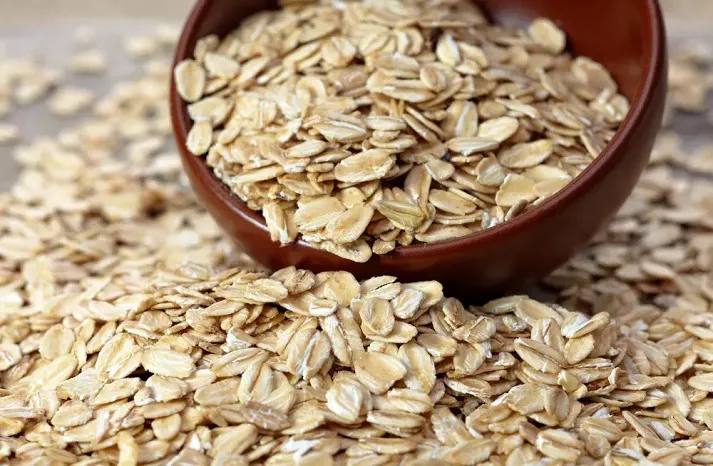Oatmeal, a humble and wholesome breakfast staple, has gained recognition as a nutritious powerhouse. This versatile grain offers a wide range of health benefits that make it a popular choice for individuals seeking a nutritious start to their day. In this article, we’ll explore the many reasons why oatmeal is considered good for your health.
1. Nutrient-Rich
Fiber: Oatmeal is an excellent source of dietary fiber, particularly a type called beta-glucan. This soluble fiber helps lower cholesterol levels and promotes a feeling of fullness, aiding in weight management.
Protein: Oats contain a moderate amount of protein, making them a satisfying and nutritious breakfast option.
Vitamins and Minerals: Oats provide essential vitamins and minerals, including manganese, phosphorus, magnesium, and B vitamins like thiamin and pantothenic acid.
2. Heart Health
Cholesterol Reduction: The beta-glucan in oats has been shown to reduce LDL (bad) cholesterol levels, which can lower the risk of heart disease.
Blood Pressure: Oats contain compounds that may help regulate blood pressure, contributing to heart health.
Antioxidants: Oatmeal contains antioxidants, such as avenanthramides, which have anti-inflammatory and heart-protective properties.
3. Weight Management
Satiety: The high fiber content in oatmeal helps you feel full for longer, reducing the likelihood of overeating between meals.
Stable Blood Sugar: Oats have a low glycemic index, meaning they release energy slowly, helping stabilize blood sugar levels and prevent sudden spikes and crashes.
4. Digestive Health
Improved Digestion: The fiber in oatmeal supports a healthy digestive system by promoting regular bowel movements and preventing constipation.
Gut Health: Oats act as a prebiotic, nourishing the beneficial bacteria in the gut and promoting a balanced microbiome.
5. Versatility and Customization
Versatile Base: Oatmeal serves as a blank canvas, allowing you to customize it with various toppings and ingredients to suit your taste and dietary preferences.
Variety: You can enjoy oatmeal as overnight oats, baked oatmeal, oatmeal pancakes, or in smoothies, ensuring that you never get bored with your breakfast.
6. Dietary Flexibility
Gluten-Free Options: While oats are naturally gluten-free, they can be cross-contaminated with gluten-containing grains during processing. Certified gluten-free oats are available for individuals with celiac disease or gluten sensitivity.
7. Budget-Friendly
Affordability: Oatmeal is a budget-friendly food option that provides excellent nutrition for the cost.
Conclusion:
Oatmeal is a nutritional superstar that offers a multitude of health benefits. Its fiber content supports heart health and aids in weight management, while its versatility and customization options make it a favorite breakfast choice for many. Whether you prefer a simple bowl of oatmeal with fruit or get creative with your toppings, incorporating oatmeal into your diet can be a tasty and health-conscious decision that promotes overall well-being.
FAQs about the benefits of oatmeal:
Q1: Can oatmeal help with weight loss?
A1: Yes, oatmeal can aid in weight loss due to its high fiber content, which promotes a feeling of fullness and reduces overeating between meals. Additionally, its low glycemic index helps stabilize blood sugar levels, reducing the likelihood of energy crashes that lead to snacking.
Q2: What is beta-glucan, and why is it important in oatmeal?
A2: Beta-glucan is a type of soluble fiber found in oatmeal. It plays a crucial role in lowering LDL (bad) cholesterol levels and promoting heart health. It also contributes to the feeling of fullness, making oatmeal a satisfying breakfast option.
Q3: Are there any potential side effects of eating too much oatmeal?
A3: While oatmeal is generally safe and nutritious, eating extremely large quantities of oats can lead to excessive fiber intake, potentially causing digestive discomfort, gas, or bloating. It’s important to consume oatmeal in moderation as part of a balanced diet.
Q4: Can people with diabetes eat oatmeal?
A4: Yes, oatmeal can be a good choice for people with diabetes. Its soluble fiber, beta-glucan, can help stabilize blood sugar levels and improve insulin sensitivity. However, it’s essential to be mindful of portion sizes and choose plain oats or those with minimal added sugars.
Q5: What are some creative oatmeal toppings or mix-ins?
A5: Oatmeal can be customized with a wide range of toppings and mix-ins. Popular options include fresh or dried fruits, nuts, seeds, honey, yogurt, cinnamon, nut butter, and dark chocolate chips. The possibilities are endless, allowing you to create a personalized and flavorful breakfast.
Q6: Are instant oatmeal packets as nutritious as traditional rolled oats?
A6: Instant oatmeal packets are convenient but may contain added sugars and artificial flavors. Traditional rolled oats typically have fewer additives and offer better control over your ingredients. You can enhance the nutrition of instant oatmeal by adding healthy toppings like fruits and nuts.
Q7: Is oatmeal suitable for a gluten-free diet?
A7: While oats themselves are naturally gluten-free, they can be cross-contaminated with gluten during processing. If you have celiac disease or gluten sensitivity, opt for certified gluten-free oats, which are processed in facilities free from gluten contamination.
Q8: Can oatmeal be part of a low-carb diet?
A8: Oatmeal is relatively high in carbohydrates, so it may not be suitable for very low-carb diets like keto. However, you can moderate your portion size and choose steel-cut oats, which have a lower glycemic index and a slower impact on blood sugar levels, making them a better option for some low-carb diets.
Q9: Is oatmeal recommended for children and the elderly?
A9: Oatmeal is suitable for people of all ages. It’s often recommended for children as a nutritious breakfast option due to its fiber and nutrient content. For the elderly, oatmeal can provide a soft, easy-to-digest meal while supplying essential nutrients.
Q10: Can oatmeal help reduce the risk of heart disease?
A10: Yes, oatmeal is associated with a reduced risk of heart disease. Its high fiber content, especially beta-glucan, can help lower LDL cholesterol levels, which is a significant risk factor for heart disease. Consuming oatmeal regularly as part of a heart-healthy diet can contribute to cardiovascular well-being.





















